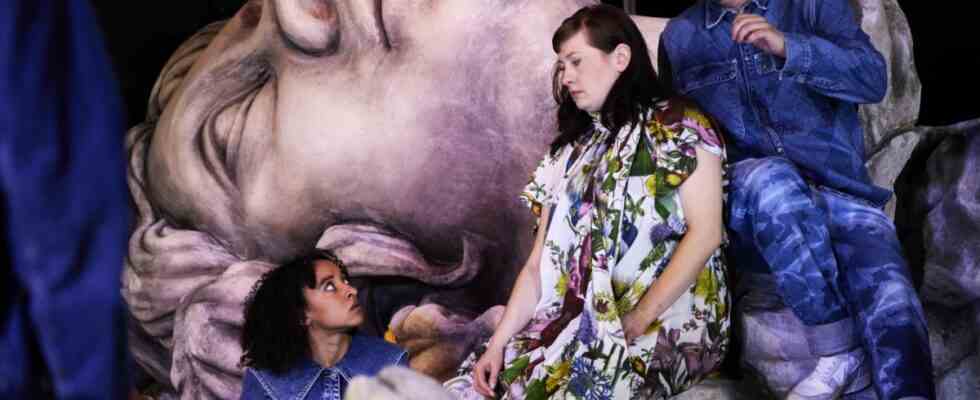The end is always difficult. It’s over, over, when it’s so beautiful right now. Or at least could get better. The desire to stay a little longer seems to have been innate in people. Even children develop outrageous strategies to avoid having to go to bed in the evening. What is it like when all of humanity is to go? Billions of whinges. In any case, in Nele Stuhler’s play “Gaia saves the world” the people have no desire to accept the end. They clamor, flatter, discuss, make reproaches and admit guilt, somehow believe they can buy time. They’re racing against what they themselves know is final. And at the premiere at the Staatstheater Nürnberg, that is just as absurd as it is funny and, sadly, it is also true.
What used to be reserved for art has long since spilled over into our reality with climate change – the images of an apocalypse perceived as such. how to deal with it Stuhler has found an answer: with humor. This is more effective than any warning and morale thrown off the stage. In “Gaia saves the world” – the second part of a trilogy – Stuhler deals with the end of mankind without using science fiction or contemporary diagnoses. The author connects Greek mythology with the story of mankind’s creation and its self-inflicted downfall. And that’s great.
People ruin everything
At the center of her trilogy is the primal mother Gaia. In the second part, she now has the feeling that something is still missing in her creation. But she doesn’t really know what, so she tries around a bit, Zeus and Prometheus are allowed to have a go, and that’s how the people emerge, somewhat uncontrolled. The gods let these beings do as they please. And, surprise, it turns out: a bad idea, because people ruin everything. Here Stuhler uses a clever trick: With Gaia as a personified creator and creation, a dialogue is possible, people can talk to her. You can beg them like children that they want to stay even though everything is broken. This discussion is at the heart of the drama – and an extremely witty stage commentary on the climate debate, which has been exposed here as hollow. Humor, Stuhler demonstrates, is a beautiful, evil tool. But maybe also one that in a few years nobody will be using on this topic anymore.
With director Branko Janack there is now someone in Nuremberg who can bring the comedy present in “Gaia saves the world” to the stage. Despite the subject matter, there is nothing sad about it, quite the opposite. It begins with the appearance of the gods between the ruins of a colossal statue (stage design: Cleo Niemeyer-Nasser). Ulrike Arnold opens the game as a myth, drawing a history writer with fragile grandeur who is seldom willing to give up the reins. You understand that as soon as Zeus and Prometheus appear. Thorsten Danner’s father of the gods is busy distributing his seed, and Raphael Rubino’s fire thief is of enormous simplicity and calm, so that one could assume he originated from the gods Olympus in Berlin-Kreuzberg.
So overdrawing is desired this evening and will be finely balanced. Anna Klimovitskaya, Nadège Meta Kanku and Nicolas Frederick Djuren are also masters of this, who equip their people with the outrage of an angry crowd without agreeing with them. And then there’s Lisa Mies, sovereign as the primal mother Gaia, who brings so many facets to bloom that she didn’t need a flower dress. They all now show how absurd it is to have a discussion when everything has already been done. It’s a bleak panorama, no doubt, but one to behold. Because it’s still warm.

